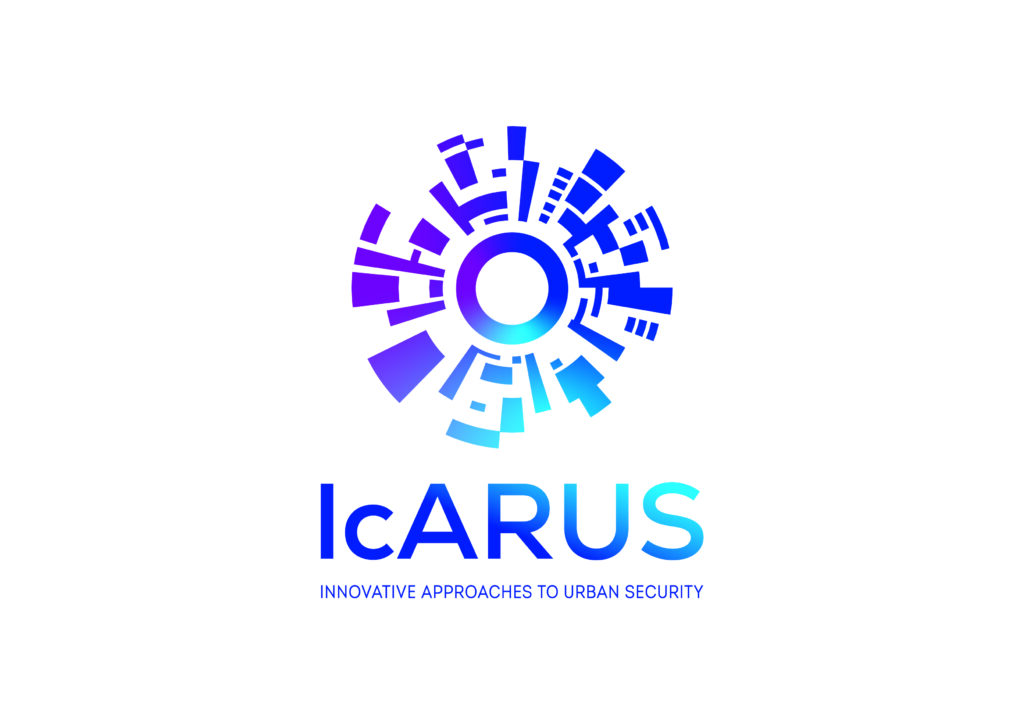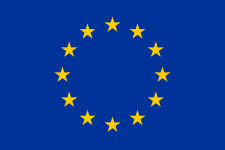
The IcARUS project (Innovative AppRoaches to Urban Security) is coordinated by Efus, with a consortium of 17 European partners, including universities and research institutions, local authorities as well as civil society and private sector organisations.
IcARUS aims to learn from past experiences in urban security policies and practices throughout Europe. The project’s main objective is to rethink, redesign and adapt existing tools and methods to help local security actors anticipate and better respond to security challenges.
Find out more in the project’s brochure here.
Sign up for IcARUS’ newsletter here.
Objectives
The project’s main objective is to rethink, redesign and adapt existing tools and methods to help local security actors anticipate and better respond to security challenges in the context of:
- A decline in citizens’ trust in institutions, local elected officials and other security and prevention actors;
- Drastic budgetary cuts and various contemporary crises that affect local and national authorities;
- The development of smart cities, which implies the efficient inclusion of technological innovations in crime prevention.
Focus areas
IcARUS will focus on four areas that have been identified by local and regional authorities as enduring security challenges :
- Preventing juvenile delinquency;
- Preventing radicalisation leading to violent extremism;
- Designing and managing safe public spaces;
- Preventing and reducing trafficking and organised crime.
These will also be examined in the light of four cross-cutting issues of:
- governance and diversification of actors,
- technological change,
- gender,
- transnational & cross-border issues.
Methodology
The project will review and reassess past and present urban security policies to provide socially and technologically innovative strategies and tools adaptable to specific local contexts.
We will develop custom-made solutions to security challenges, which will incorporate social as well as technological innovations.
The tools will be designed through a constant process of defining, ideating, prototyping, testing, evaluating and adapting by local authorities. This process will ensure that they are effective and meet the collective needs of citizens.
Consultative Committee of Cities
A Consultative Committee of Cities and law enforcement agencies (LEA’s) supports the implementation of the project. The Committee provides consortium partners with practitioner perspectives and feedback. The Committee thus supports the design and implementation of the tools developed in the project. It has a key role in strengthening multi-level governance and local partnerships. It is also expected to be a central channel of communication and dissemination of the toolkit and the overall results of the project.
A greater involvement of cities will allow more end users to benefit from the tools and methods developed in the context of the project, throughout its course.
- City of Malmö (SE)
- City of Mechelen (BE)
- Region of Emilia-Romagna (IT)
- City of Gdansk (PL)
- Departament d’Interior – Generalitat Catalunya (ES)
Expert Advisory Board
Barbara Holtmann, Director, Fixed.Africa and non-executive President of the Board, Women in Cities International
Laetitia Wolff, Design Impact Consultant, Besign, The Sustainable Design School in Nice
Thierry Charlois, Night Policy Project Manager, Paris City Council
Tim Chapman, Chair of the board of the European Forum for Restorative Justice
Patrick Charlier, Director – Unia
Factsheets
Design Thinking Methodology in the context of the IcARUS Project -Factsheet #1
This factsheet is based on research conducted for the IcARUS reports “Methodology for the adoption of DT in urban security & crime prevention initiatives” (D1.1) and “Guidelines to the DT implementation in IcARUS task” (D1.2).
Prevention of Juvenile Delinquency: relevant international and national regulations – Factsheet #2
This factsheet is based on research conducted for the IcARUS report “Legal adjustment report of IcARUS to the relevant international and national regulations” (D6.1).
Using research to inform urban security strategies – Factsheet #3
This factsheet is based on research conducted by IcARUS for the public report “The Changing Face of Urban Security Research” (D2.1), and it further communicates how can research inform the urban security strategies.
Learning from the past: 30 years of crime prevention and urban security – Factsheet #4
This factsheet is based on research conducted by IcARUS for the public report “The Changing Face of Urban Security Research” (D2.1), and it further communicates how can research inform the urban security strategies.
Investing in Prevention Time to Embrace the Research Evidence – Factsheet #5
This factsheet is based on research conducted by IcARUS for the public report “The Changing Face of Urban Security Research” (D2.1), and it further communicates how can research inform the urban security strategies.
Spotlight on Preventing Radicalisation leading to Violent Extremism- Factsheet #6
This factsheet is based on research conducted by IcARUS for the public report D2.1 The Changing Face of Urban Security Research, and it further communicates the learnings related to prevention of radicalization leading to violent extremism.
Spotlight on Preventing and Reducing Trafficking and Organised Crime – Factsheet #7
This factsheet is based on research conducted by IcARUS for the public report D2.1 The Changing Face of Urban Security Research, and it further communicates the learnings related to prevention for reducing traffickind and organized crime, and improving Urban Security.
Spotlight on preventing Juvenile Delinquency – Factsheet #8
This factsheet is based on research conducted by IcARUS for the public report D2.1 The Changing Face of Urban Security Research, and it further communicates the learnings related to prevention of juvenile delinquency for improving Urban Security.
Spotlight on Designing and Managing Safe Public Spaces – Factsheet #9
This factsheet is based on research conducted by IcARUS for the public report D2.1 The Changing Face of Urban Security Research, and it further communicates the learnings related to designing and managing safe urban spaces for improving Urban Security.
IcARUS’ newsletter articles
May 2023
- State of the Art Review and Key Lessons
- IcARUS mid-term conference: harnessing 35 years of local policies and practices to design innovative solutions
- Innovation meets ideation: The IcARUS Design Thinking workshops gathered a variety of stakeholders to develop innovative solutions that tackle urban security challenges
- Lisbon IcARUS Local Workshop “Help create innovative solutions for your city!”
January 2023
- Interview with Gian Guido Nobili, Head of the Urban Security and Crime Prevention Unit of the Emilia-Romagna Region (member of the Consultative Committee of Cities in IcARUS)
- IcARUS project has co-produced and published a Roadmap for the improvement and definition of novel urban security tools
- IcARUS Research Overview web-interactive tool released!
- Efus organised a session at the 24-hour online conference of the Global Initiative Against Transnational Organized Crime
July 2022
- State of the Art Review and Key Lessons
- Lisbon IcARUS Local Workshop – “Help create innovative solutions for your city!”
May 2022
November 2021
- Rethinking Crime Prevention: IcARUS at Efus’ Security, Democracy, and Cities Conference
- The Evolution of Innovative Approaches to Build More Secure and Safer Public Spaces
- Engagement and Communication: An update on the State of the Art Review
September 2021
May 2021
- Do you speak IcARUS? Why the project has created a common glossary of terms
- Design Thinking virtual training workshops: A fun and fruitful experience
- How IcARUS is leading innovation for urban security
- Consultative Committee of Cities Interview – Werner Van Herle
- Expert Advisory Board Interview – Dr. Barbara Holtmann
April 2021
- Framework of Rules of Ethics of Criminological Research. In the light of the General Data Protection Regulation (GDPR)
- Urban Crime – An International Journal
February 2021
- Understanding the needs and expectation of the project’s six partner cities: a research conducted by the University of Leeds
- Thinking out of the box: How the Design Thinking innovative approach shapes the project
- Turin: Juvenile Delinquency is a priority
- Stuttgart: remaining safe at a time of fundamental changes
- Riga: a holistic approach to the security of public spaces
- Rotterdam: an open window to the world
- Nice: pioneering new urban security solutions
- Community policing in Lisbon – Sustainable local partnerships for safer neighbourhoods
December 2020
- Ensuring that IcARUS complies with high ethical and legal standards
- Testing, implementation and evaluation of the tools
- Urban Security in the last 30 years: an upcoming in-depth analysis
- Combining methodology and innovation: the IcARUS approach
- Welcome to The IcARUS Project
Sign up for IcARUS’ newsletter and find all the previous newsletters here.
Public reports
Results from Cross-Training Task
- Methodology for the Adoption of Design Thinking in Urban Security and Crime Prevention Initiatives
- Guidelines to the Design Thinking implementation in IcARUS task
- Visual Identity
- Strategic Dissemination and Communication plan. V1
- Creation of the project’s webpage and social networks
- Project Management Guide
- Risk Management and Quality Assurance Plan
Policy briefs
- Acknowledging the Key Role of Local and Regional Authorities in Crafting Inclusive Community-Based Initiatives To Prevent Radicalisation Leading to Violent Extremism
- Building resilient communities: The local roots and impacts of organised crime
- Fostering Youth Engagement for Juvenile Delinquency Prevention
- Fostering Community Involvement in Safe Public Spaces
- Unveiling the Power of Social Innovation in Urban Security
The role of Efus
Efus is the coordinator of the IcARUS project.
Consortium
Project Coordinator:
Efus
Local authorities:
City of Stuttgart (DE), City of Riga (LV), City of Rotterdam (NL), City of Nice (FR), City of Lisbon (PT), City of Turin (IT)
Universities and research partners:
Salzburg University of Applied Sciences (AT), Erasmus University of Rotterdam (NL), Panteion University (GR), University of Salford (UK), University of Leeds (UK), IDIAP Research Institute (CH), KEMEA (ES)
Civil society and private sector organisations:
Plus Ethics (ES), Makesense (FR), Camino (DE)
Dissemination and Communication
LOBA (PT)
Duration
September 2020 – August 2024
Contacts
Pilar De La Torre, Programme Manager – delatorre@efus.eu
Marta Pellón Brussosa, Programme Manager – PellonBrussosa@efus.eu
Anne Boisseau, Programme Manager – boisseau@efus.eu
IcARUS on social media

The IcARUS project has received funding from the European Union’s Horizon 2020 research and innovation programme under grant agreement no. 882749

